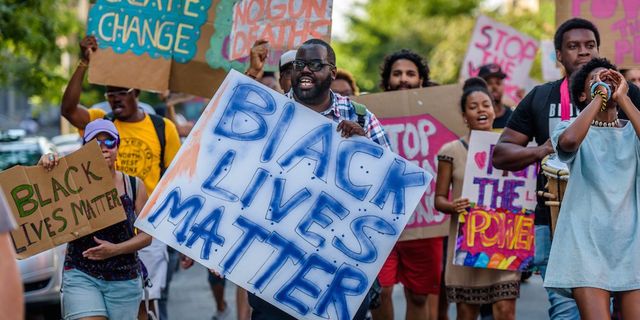Racial discrimination is a well-documented, widespread problem in our country. The Black Lives Matter movement has recently been shining a necessary light on the growing number of police shootings involving innocent victims, but we have many miles to go before reaching a place of total equality.
Unfortunately, people of color also have less access to health care, employment, and education, according to previous research. And now, a new study published in the American Journal of Public Health says that if you've been discrimated against based on your race, you might be at great risk for mental health issues.
RELATED: The Sickening Truth About What It's Like to Get Your Period in Prison
For the study, which focused on people in the U.K., researchers analyzed data from about 40,000 households (4,000 of which were minority families) from 2009 to 2013. They asked participants to answer questions about whether they had ever been insulted, called names, threatened, or physically attacked in the last 12 months. If they had, they were then asked to specify their sex, age, ethnicity, sexual orientation, and disability status.
RELATED: How to Deal if Someone Is Relentlessy Harassing You on Twitter
The study authors found that racial minorities who were repeatedly exposed to physical or verbal threats based on racial motives over a five-year time frame had a higher number of mental health problems than minorities who hadn’t been subject to racial discrimination. People most at risk were those who said they felt unsafe or avoided specific places where they felt they might be abused for their race.
Sign up for Women's Health's new newsletter, So This Happened, to get the day’s trending stories and health studies.
The findings suggest that if you've been racially discriminated in the past, the experience can continue to affect your mental health in the future, says study author Laia Bécares, Ph.D., a research fellow at the University of Manchester’s School of Social Sciences and in the Center on Dynamics of Ethnicity, in a press release. "Our research highlights just how harmful racial discrimination is for the health of ethnic minorities," she writes. "We see how the more racism ethnic minority people experience, the more psychological distress they suffer from."
Given this info, it's even more imperative we do as much as we can to end racial discrimination in our country. Here are a few ways you can help: Write to your congress members and senators to urge them to end law enforcement practices that target minorities, vote for political candidates who support measures that combat racism, and voluteer with or donate to organizations like Community Change, Inc. and Black Girls Code, which aim to promote racial equality.














